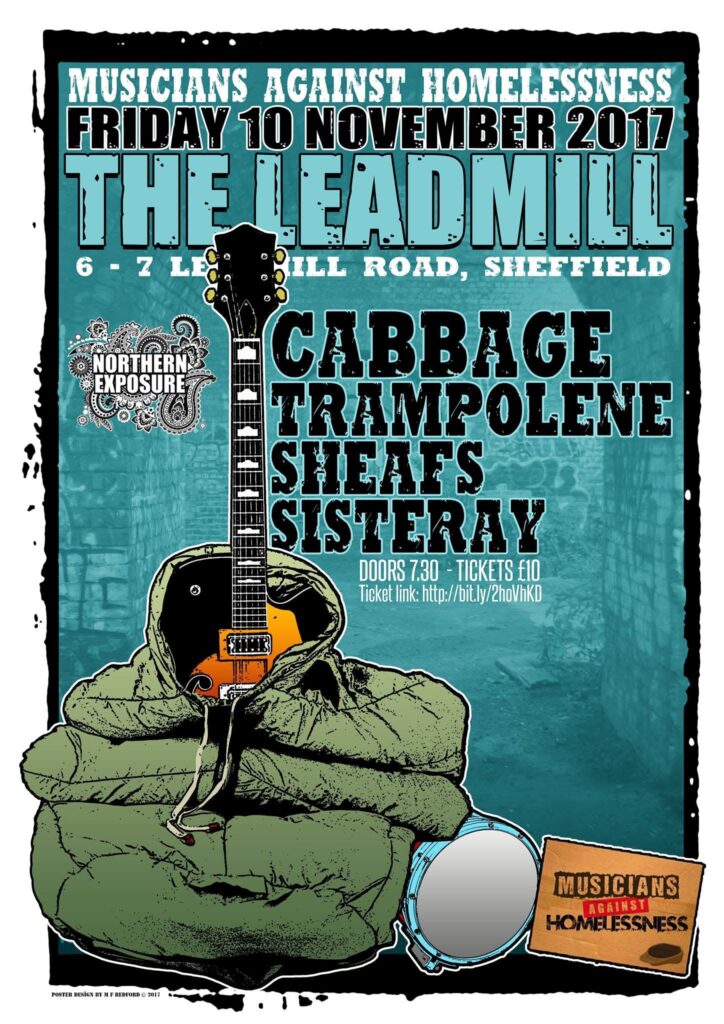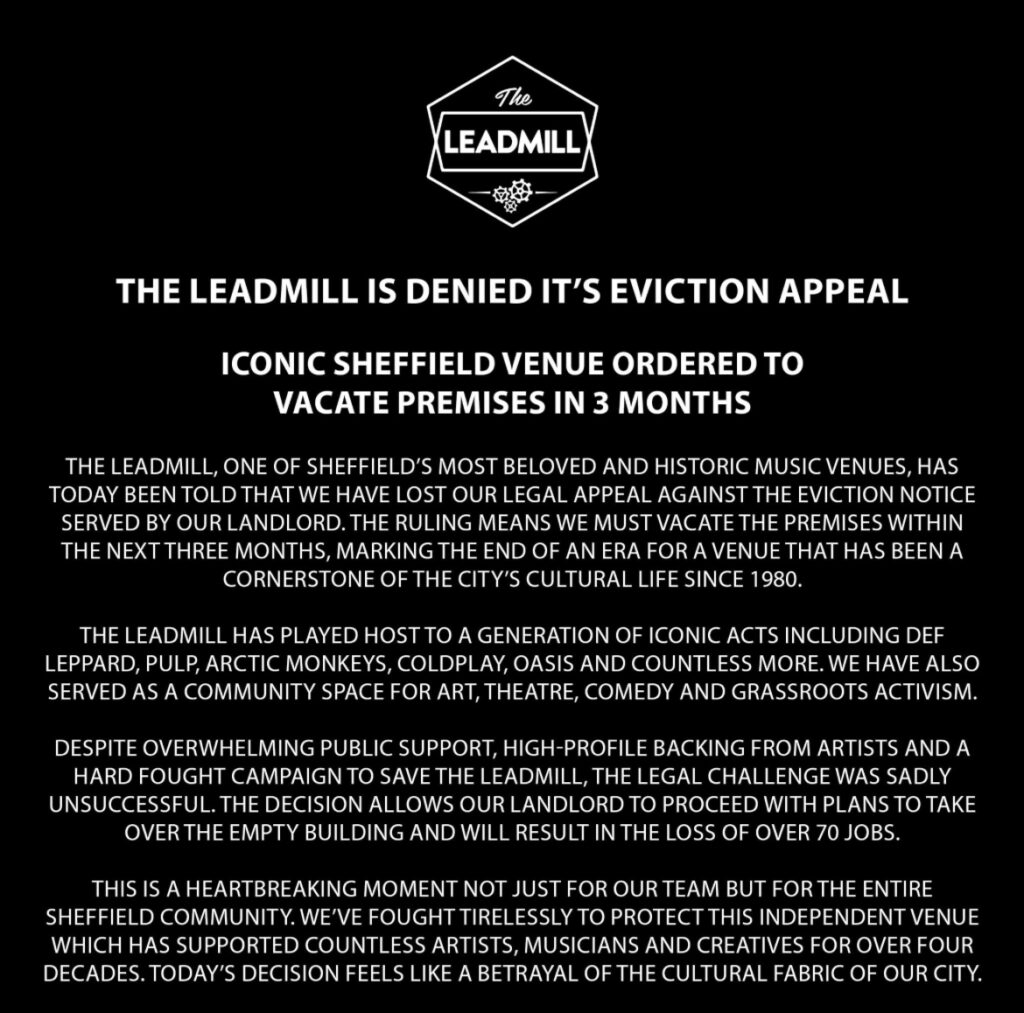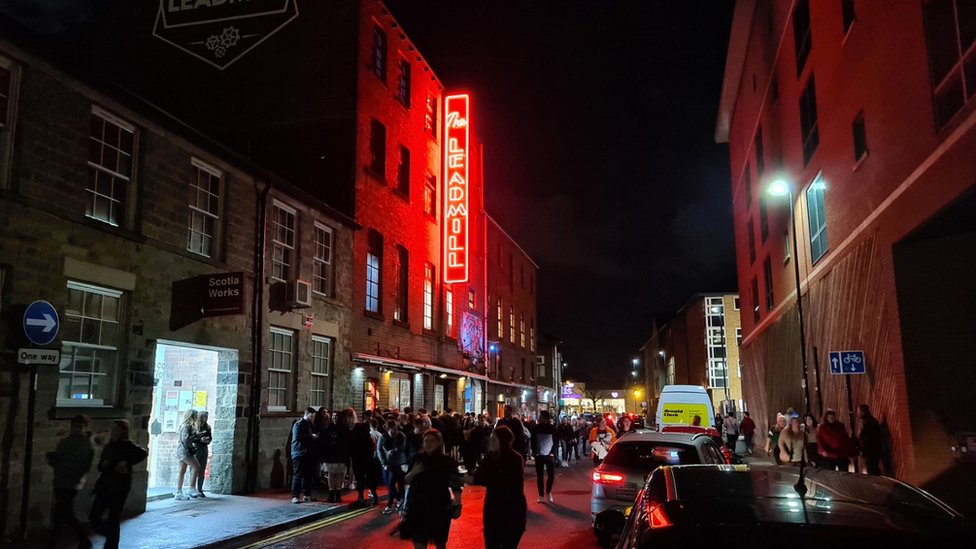ICONIC VENUE THE LEADMILL LOSE BATTLE TO STAY AT VENUE TO ELECTRIC GROUP

I’ve been going to The Leadmill since I was 18, and it has always been my favourite venue. It’s the place where I’ve watched and photographed some of my favourite bands, experienced and put on some unforgettable gigs, and even had an office above it for a time. The Leadmill has always been more than just a venue, it has been a meeting place for music lovers, artists, and hopefuls who gathered together to create something special. And oh boy, it did. The Leadmill has been a leading live music venue ever since it opened its doors to entertainment in 1980, playing host to well-known musicians and personalities within British music.

The Leadmill has seen the rise of Arctic Monkeys from cult heroes to international superstars. Oasis have graced the stage. The award-winning frontman for Pulp, Jarvis Cocker, cut his teeth here before joining to spearhead the Britpop phenomenon. Coldplay burst onto the musical scene with their anthemic stadium rock, and The Strokes thrilled audiences with garage-punk passion. Def Leppard, hailed as rock royalty from Sheffield, then gave a ‘One Night Only’ show for the venue’s anti-eviction crowdfunding campaign in 2023.
The city’s cultural heritage is expressed not only within its musical heritage but also within other creative fields, an outcome largely owing to the work done by Martin F Bedford. A resident artist at The Leadmill, Bedford moved to the city in 1976 as an art student and, between 1980 and 1992, created promotional posters for the venue. His work, which is now celebrated, was far more than promotion, giving an insight into the music scene within Sheffield, highlighting in particular the work of artists like Pulp, Richard Hawley, and Patti Smith. We were lucky to have Martin do our gig posters for a while.
For many, The Leadmill was a sanctuary, a home. Participating through performances on its stage, giving back through volunteer administration roles, or simply attending as an audience member allowed the building of an endless source of memories. This venue was typified by an environment that broke barriers, allowing performers to express themselves while acknowledging the audience members to be entertained by those they loved.
The threat faced by The Leadmill is symptomatic of a larger crisis within grassroots music spaces all over the United Kingdom. Grassroots music spaces are an important part of the music industry, nurturing new talent, fostering musical communities, and creating spaces which facilitate cultural and communal prosperity.
But while the building will remain a music venue, it will no longer be The Leadmill as people know it. The current management team, who have run the venue for decades, are being forced out by the landlord, Electric Group, who plan to take over operations themselves. This means the venue will lose its independent identity, its staff, and the unique atmosphere that made it a cornerstone of Sheffield’s music scene. Many fear that under new management, it will become a corporate-run space, rather than a grassroots venue that nurtures emerging artists and supports the local community.


Because let’s be honest here, this about the money and nothing says preserving history like gutting out its soul, buffing it to a corporate-approved shine, and slapping on a rebrand like it’s a Starbucks drive through. The Leadmill isn’t just bricks and a stage, this is what they don’t get, it’s decades of sweat, passion, and musical magic that Electric Group seems more than happy to bulldoze in favour of a slick, soulless upgrade. Sure, they say it’ll still be a music venue, but without the people who made it special, all they’re really offering is a glossy monument to what once was.
The Leadmill’s team has described the eviction as a betrayal of Sheffield’s cultural fabric, with over 70 jobs lost and a major blow to independent music. Which it totally is. While Electric Group insists they will invest in the venue and continue hosting gigs, supporters argue that a name and a building aren’t enough it’s the people, history, and ethos that made The Leadmill special. This is why the closure has sparked outrage among musicians and fans. The fight wasn’t just about keeping a music venue open, it was about preserving a historic, independent institution that has shaped Sheffield’s music scene for over 40 years.
The number of small and medium-sized live music venues has seen a sharp decline over the last few years. This is another point, the money men are taking over. In 2024, 125 grassroots music venues closed down, leading to a 16% decline in the overall number of small live music venues. Rising rents, stringent licensing requirements, noise complaints, and changing nightlife scenes have increasingly challenged the viability of grassroots music venues.

While festivals and large events are still thriving, smaller venues, which allow upcoming artists to be discovered, are on the decline. This trend threatens the future of the live music industry because up-and-coming musicians have fewer chances to hone their craft and get noticed.
The loss of grassroots clubs has far-reaching consequences. Without them, new music talent has fewer opportunities for live gigs and building a support base. Cities like Sheffield, Liverpool, and Birmingham have suffered greatly as live music activity has been diminished, which impacts the cultural identity of urban spaces. Small clubs also make an economic contribution through the provision of jobs, tourism, and live entertainment. The loss of them means job losses and less income for existing businesses. With the disappearance of the small clubs, the music industry is further concentrated under corporate control, meaning less diversity and accessibility.

Organisations like the Music Venue Trust have been actively campaigning for the protection of live music venues, calling for government support, financial aid, and equitable business rates. They argue that larger venues and ticketing businesses have an obligation to support grass-roots venues, thus guaranteeing that new live acts are given real opportunities to develop. Despite numerous challenges, numerous other sites still pose significant threats.
Closure of The Leadmill is a negative blow to the music industry within Sheffield, but it also mirrors a broader trend that threatens the viability of live music throughout the United Kingdom. Grassroots music clubs rely on the support of locals for their survival. Concert attendance, support for local musicians, and lobbying for fair policies are crucial activities that may be attributed to the long-term survival of grassroots clubs. Closure of The Leadmill could be a catalyst for rallying support for the survival of iconic venues and their legacy.
RACHEL BROWN WORDS AND PHOTOS




